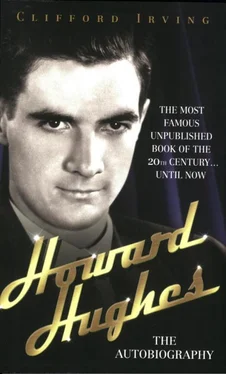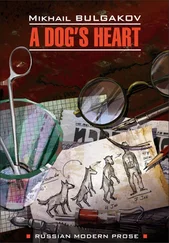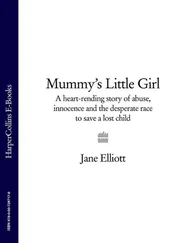A last absurdity: handwriting experts confirmed that the ‘Hughes’ letters had to be genuine, declaring that to consistently imitate the distinctive idiosyncrasies in Hughes’ handwriting would be ‘beyond human ability.’
One can only admire Irving’s chutzpah. He began to feel invincible. So invincible, that in a moment of recklessness, he actually offered to take a lie detector test to prove his credibility. It was a bluff, of course, but McGraw Hill called it. The results were ‘inconclusive’, and McGraw-Hill never raised the matter again.
* * *
On January 7, 1972 Howard Hughes finally broke cover. From his hotel suite in the Bahamas he addressed a bizarre televised press conference, in which seven reporters sat around a horseshoe-shaped table addressing questions to a disembodied voice coming from a speaker set on a stand.
Hughes maintained he had never met Irving, and called the ‘autobiography’ ‘totally fantastic fiction.’ He added, ‘I don’t remember any script I ever saw in Hollywood as wild or imagination-stretching as this.’
Irving promptly replied that the disembodied voice was not Hughes, but an impostor. Forced into an appearance on America’s top-rated current affairs programme, 60 Minutes , he brandished one of his forged letters, and described his meetings with Hughes: ‘He has on occasion worn false beards and false moustaches and wigs. There’s a James Bond set-up here that’s out of the worst possible detective novel you could ever read.’
But the net was drawing tighter. Swiss authorities had been making their own investigations into the Zurich bank account of ‘H.R. Hughes’, theorizing that it was actually Irving’s wife who was depositing the cheques and withdrawing the money. (There’s a moral here: never trust the ‘confidentiality’ of Swiss banks). In the face of this clinching piece of evidence, Irving finally admitted to his lawyer that the whole thing was a sham.
‘The relief of confession’, he writes in The Hoax , ‘was sweet beyond almost anything I had ever known. I constantly had to lie to people, and there came a moment when the weight of that lie asserted itself, when I realised how seriously people were taking what Dick and I thought of as a game. When it all finally began to unravel, a number of newspapers commented on how light-hearted I seemed to be in the face of this; they were all talking about “Irving laughing”. Of course I was laughing. I was rid of the burden! I didn’t have to lie anymore. I was laughing because it was over.’
* * *
In June 1972, Clifford Irving was sentenced to two and a half years’ imprisonment on charges of Conspiracy to Defraud Through Use of the Mails. Irving’s wife, Edith, spent one year in a Swiss prison. Dick Suskind was sentenced to six months’ imprisonment in New York. Irving returned to McGraw-Hill most of the money, retrieved from its hiding-places in the Ibiza farmhouse and in Swiss banks. But a fair amount had been spent on expenses and lawyers’ fees, and the author had been forced to pay taxes even on the money he returned.
Sixteen months later he emerged from prison with his life in tatters. For a long time, he says, ‘Many publishers wanted to have lunch with me, but none were prepared to publish my books. I’d pissed on publishing. That had never been my intention, but I had embarrassed a great many people who believed in the legitimacy of the autobiography. They were shown to be gullible, greedy, and, above all, unprofessional.’ It took many years for people to stop regarding the author as Irving the hoaxer, and accept him as Irving the author. Once that happened, his books became best sellers.
In 2007 a film version of The Hoax was released, starring Richard Gere as Irving. But for the author the movie misses the point. ‘It depicts the writing of the autobiography as the act of a desperate man, bent on financial gain. The Hollywood gang never grasped that I was enjoying myself by creating a mounting series of intellectual and personal challenges. Maybe those challenges were amoral – even immoral. I’m emotionally too close to the event to comment credibly. But, since no blood flowed and nothing was broken except egos, isn’t the book itself justification enough?’
Is it? Let the reader decide.
For this reader The Autobiography of Howard Hughes is a brilliant weaving together of truth and falsehood – one might call it a ‘metalife’ – so artfully realised that even today it is hard to know where one ends and the other begins.
Dick Suskind died in 1999. Edith continues to live in Ibiza, in the same farmhouse where she and her former husband plotted the hoax. Howard Hughes died in 1976, but never took the time to write his autobiography.
‘Perhaps,’ Clifford Irving says, ‘when he read what I’d written on his behalf, he was satisfied with it.’
Mick Brown
The Daily Telegraph London, 2008
HOWARD HUGHES AND I first met in Hollywood on the set of The Outlaw , which would place the date as circa 1940. My father, Jay Irving, was a cartoonist for Collier’s. He also had a mild interest in the birth of the television industry, as did Hughes, and they were casual friends. As a result, one morning my father and I were invited to visit the sound stage at RKO. I can remember sneaking briefs looks at Jane Russell’s breasts – I was only nine years old and other events remain blurred. Although my father later lost touch with Hughes, he had fond memories of him as ‘a shy and considerate man,’ a phrase I’ve heard echoed by others who knew him in those early years.
I grew up and became a novelist, and after a time made my home on Ibiza, one of the Balearic Islands off the coast of Spain. I described it in an Esquire article as ‘the Saint-Germain-des Pres of the Mediterranean, a lovely island, warm and swinging in summer, bearable in winter, cheap in any season.’ A strange place too, full of borderline lunatics and dropouts from contemporary life. They prepared me for appreciating Howard Hughes, the quintessential dropout.
In 1969 I published my first nonfiction book, Fake! , the true tale of an expatriate Hungarian art forger named Elmyr De Hory. My father gave me a list of ‘well-connected’ friends to whom I should send copies; he badgered me, as fathers do, and I took the line of least resistance and faithlessly promised, as sons do. He died in June of 1970 and shortly afterward, feeling remorseful about unfulfilled promises I had made him, I mailed copies of the book to a few people on the list. Howard Hughes was among them. I included a note reminding Mr. Hughes where and when we had met, and then I forgot about it.
Five months passed before I received an undated letter on yellow lined legal paper, the kind you can buy in any office supply store. The scrawled handwriting was firm extended well over the ruled left-hand margin the way a schoolboy might write if he were getting down toward the end of the pad. It said:
Dear Mr. Irving—
Thank you for the gift of your book, which I thoroughly enjoyed reading. Your inscription was very thoughtful.
I find myself deeply interested in the fellow you have written about, despite a natural inclination to the contrary. I cannot help wondering what has happened to him. I would hate to think what other biographers might have done to him, but it seems to me that you have portrayed your man with great consideration and sympathy, when it would have been tempting to do otherwise. For reasons you may readily understand, this has impressed me.
Читать дальше













